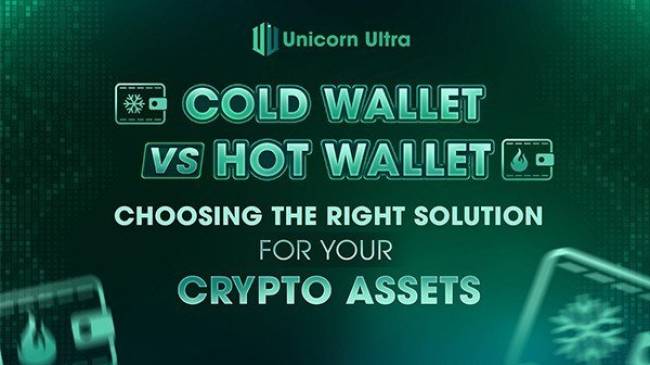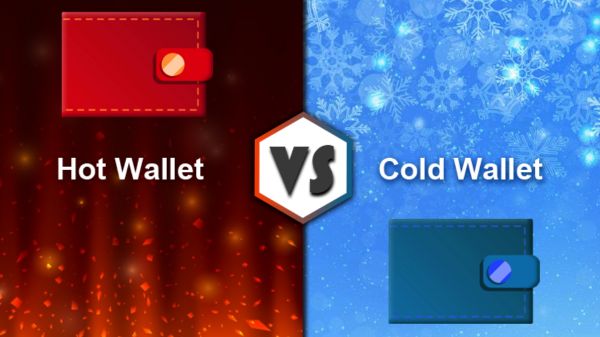Categories: General Information
Hot Wallet and Cold Wallet - Choosing the Right Solution for Your Crypto Assets
Looking to secure your crypto assets? Explore the differences between hot wallet and cold wallet and find the perfect solution. Discover the benefits of each wallet type and make an informed decision to protect your digital assets.
In the world of cryptocurrencies, security is of utmost importance. With the increasing popularity and value of digital assets, it becomes essential to safeguard them from potential threats. Two popular solutions for storing cryptocurrencies are hot wallet and cold wallet. This blog post will explore the differences between these two wallet types and help you understand which one might be the right choice for your crypto assets.
Table of Contents
Compare Hot Wallet and Cold Wallet

What is a Cold Wallet?
A cold wallet, also known as a hardware wallet or offline wallet, is a physical device designed to securely store cryptocurrencies. It operates offline, meaning it is not connected to the internet during normal use. Cold wallets store private keys, which are required to access and manage your crypto assets, in an isolated and secure environment. They offer the highest level of security due to their offline nature, making them less susceptible to hacking attempts and online threats.
Advantages of Cold Wallets
- Enhanced Security: The main advantage of cold wallets is their high level of security. Since they are offline, they are not vulnerable to online attacks or hacking attempts. Private keys never leave the device, minimizing the risk of exposure.
- Protection against Malware: Cold wallets provide protection against malware or keyloggers that may be present on your computer or mobile device. Since the private keys are stored on the hardware wallet itself, they are not exposed to potential threats on your computer.
- User Control: With a cold wallet, you have complete control over your private keys and funds. You are not reliant on third-party services, reducing the risk of your assets being compromised due to a service provider's security breach.
- Versatility: Cold wallets support a wide range of cryptocurrencies, making them suitable for users with diverse portfolios. They offer compatibility with major cryptocurrencies like Bitcoin, Ethereum, and more.
What is a Hot Wallet?
A hot wallet, also known as a software wallet or online wallet, is a digital wallet that operates on internet-connected devices such as computers, smartphones, or tablets. It allows users to access their crypto assets conveniently and facilitates quick transactions. Hot wallets store private keys online or on a connected device, making them more susceptible to security risks compared to cold wallets.
Advantages of Hot Wallets
- Accessibility and Convenience: Hot wallets provide easy accessibility to your crypto assets. You can manage your funds and make transactions on the go using a mobile app or through a web interface. They offer a user-friendly experience and are suitable for frequent trading or spending on cryptocurrencies.
- Instant Transactions: Hot wallets allow for quick transactions since they are connected to the internet. This makes them ideal for users who require instant access to their funds and need to execute transactions promptly.
- Multi-device Compatibility: Hot wallets can be used across multiple devices, enabling seamless synchronization of your crypto assets. You can access your wallet from your computer, smartphone, or tablet, providing flexibility in managing your funds.
- Additional Features: Hot wallets often come with additional features such as integration with decentralized applications (DApps), staking, or lending platforms, providing users with expanded functionality and opportunities to engage in the broader crypto ecosystem.

Hot wallet vs cold wallet - Which is better?
When deciding between a cold wallet and a hot wallet, it's important to consider your specific needs and preferences. Here are some factors to consider:
- Security: If security is your top priority and you plan to hold a significant amount of crypto assets for the long term, a cold wallet is the recommended choice. It provides the highest level of protection against online threats.
- Convenience and Accessibility: If you frequently make transactions or need instant access to your funds, a hot wallet is more suitable. It offers convenience and flexibility for managing your crypto assets on the go.
- Risk Tolerance: Assess your risk tolerance level and the amount of control you desire over your private keys. Cold wallets give you full control, while hot wallets require some level of trust in the wallet provider's security measures.

How to secure your wallet?
Securing your cryptocurrency wallet is of utmost importance to protect your digital assets from theft or unauthorized access. Whether you use a hardware wallet, software wallet, or mobile wallet, here are essential security practices to follow:
- Choose a Reputable Wallet: Use well-established and reputable wallet providers to reduce the risk of security vulnerabilities or scams. Research and read reviews before selecting a wallet.
- Enable Two-Factor Authentication (2FA): If your wallet supports two-factor authentication, enable it. 2FA adds an extra layer of security by requiring a second verification method (e.g., SMS code, authenticator app) in addition to your password.
- Use Strong Passwords: Create a strong and unique password for your wallet. Avoid using common phrases or easily guessable information. Consider using a password manager to generate and store strong passwords securely.
- Secure Your Recovery Phrase/Seed: If your wallet generates a recovery phrase (also known as a seed), write it down and store it securely offline. Never share it online, and keep it away from prying eyes.
- Avoid Public Wi-Fi: Avoid accessing your wallet on public Wi-Fi networks, as they can be vulnerable to hacking attempts. Use a secure and private internet connection.
- Update Software Regularly: Keep your wallet software and device firmware up to date to ensure you have the latest security patches and improvements.
- Backup Your Wallet: Regularly backup your wallet data and store it in multiple secure locations. This will help you recover your funds in case of device loss or failure.
- Cold Storage: Consider using a hardware wallet or an offline/cold storage solution for large amounts of cryptocurrency. These wallets keep your private keys offline, reducing the risk of online attacks.
- Beware of Phishing: Be cautious of phishing attempts. Avoid clicking on suspicious links or providing sensitive information to unknown sources.
- Use Whitelisting: Some wallets offer whitelisting features, allowing you to specify the addresses you can send funds to. This can prevent accidental or unauthorized transfers.
- Multi-Signature Wallets: If possible, use multi-signature wallets that require multiple private key signatures to initiate a transaction. This adds an extra layer of security.
- Keep Devices Secure: Protect your wallet device with passwords, PINs, or biometric authentication. Always lock your device when not in use.
- Separate Personal and Wallet Accounts: Avoid using your wallet device for general internet browsing or accessing unknown websites. Separate your wallet activities from regular internet usage.
By following these security practices, you can significantly reduce the risk of unauthorized access to your cryptocurrency wallet and keep your digital assets safe. Remember, the security of your wallet ultimately depends on your own actions and diligence, so always prioritize safeguarding your private keys and recovery phrases.
Conclusion
Both hot wallet and cold wallet serve different purposes and offer unique advantages. Cold wallets prioritize security, making them ideal for the long-term storage of significant crypto assets. On the other hand, hot wallets provide convenience and accessibility, making them suitable for regular transactions and frequent trading.
Ultimately, the choice between hot wallet and vs cold wallet depends on your individual needs, preferences, and the level of security you require for your crypto assets. It's essential to assess your priorities and strike a balance between security and convenience when choosing the right wallet solution for you.
Remember, regardless of the wallet type you choose, it's crucial to follow best security practices, such as enabling two-factor authentication, keeping your software updated, and regularly backing up your wallet. By understanding the differences between hot wallet vs cold wallet, you can make an informed decision and ensure the safety of your valuable crypto assets.
This article is for informational purposes only and should not be considered financial or investment advice. Always do your own research and consult with a professional before making any investment decisions. Follow https://uniultra.xyz/ for more blockchain updates.
